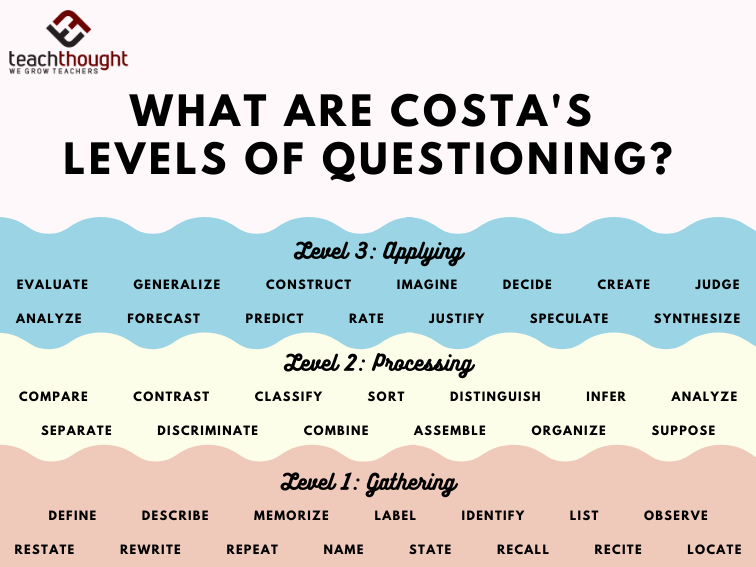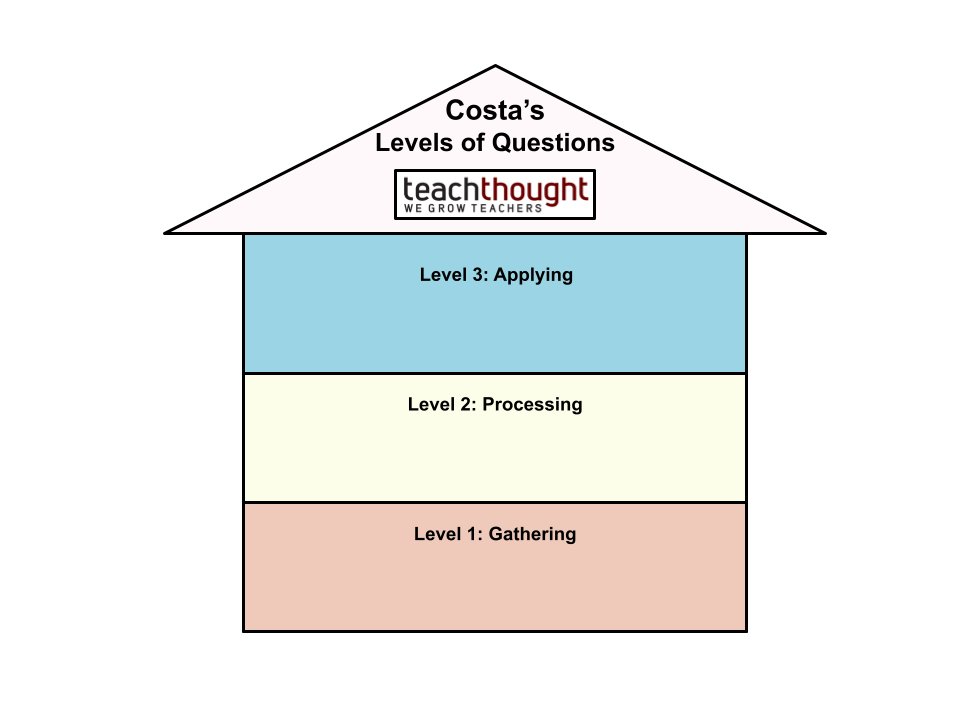

Costa’s Levels of Examining– created by educational researcher Art Costa– feature 3 tiers of questioning developed to promote higher-level thinking and query.
Comparable to Flower’s taxonomy , Costa’s reduced degree prompts trainees to use more basic professors; as students move up in degrees, the questions prompt them to use even more complex reasoning abilities. With years of research on human resilience, Dr. Costa likewise determined the 16 Practices of Mind , a collection of habits that support trainees in navigating the challenges that frequently happen in college and life, in general. Numerous of Dr. Costa’s 16 behaviors– assuming interdependently, introducing, gathering data, and applying previous expertise to brand-new scenarios– both need and strengthen greater levels of wondering about.
There is a substantive quantity of research study that sustains Dr. Costa’s schema. Newmann (1993 discovered that higher-order thinking compels students to “manipulate details and ideas in ways that transform their meaning,” and “expects trainees to address issues and establish suggesting on their own,” which straightens with a constructivist sight of education and learning
Costa’s Levels of Examining are generally shown using the metaphor of a house with 3 floors:


Level 1: Gathering
Level 1 concerns primarily need students to collaborate with details ‘on the page.’ Response to level 1 questions are usually literal; meaning, a pupil can essentially indicate the answer on a page.
We’ve formerly covered Flower’s Taxonomy power verbs , so you can predict that Costa’s levels have their own set of power verbs, also. Below are a couple of that you could discover at the start of Degree 1 questions:
- Define
- Describe
- Remember
- Tag
- Determine
- Listing
- Observe
- Restate
- Reword
- Repeat
- Call
- State
- Recall
- Recite
- Locate
- Select
- Match
- Show
Degree 1 concerns by content area might appear like these instances:
- Scientific research : Tag the parts of an animal cell.
- Mathematics : Recite the formula for discovering the volume of a cyndrical tube.
- History : Suit the name of the emperor to their respective country.
- English Language Arts : Find the area in the story where the orgasm takes place.
You can see just how most of these Level 1 power verbs require students to remember details, which is an important ability in its own right. However, educators need to pursue most of their inquiries to drop in Degree 2 or 3, which challenge pupils to use higher-order thinking skills.
Level 2: Processing
Degree 2 concerns go an action better than Degree 1, motivating pupils to process info by ‘reading between the lines.’ While students may require to use actual details to develop their reactions, Level 2 requires them to refine that information with what they already recognize in order to make new links.
Below are some instances of Level 2 power verbs:
- Compare
- Contrast
- Categorize
- Kind
- Distinguish
- Presume
- Evaluate
- Separate
- Differentiate
- Integrate
- Construct
- Arrange
- Mean
Degree 2 questions by content location might show up in the adhering to methods:
- Scientific research : Contrast the processes of mitosis and meiosis.
- Math : Categorize the geometric forms according to their variety of sides and angles.
- Social Studies : Put together the complying with historic occasions in the order of value, from most to the very least.
- English Language Arts : Analy ze the impact that the author’s tone carries the total significance of the message.
Can you see just how Level 2 questions go an action even more than Level 1 Greater than simply regurgitating details, learners take it and ‘do something’ with it. They classify, make distinctions, and compare/contrast it versus one more part to see how it impacts the entire. These kinds of abilities can stimulate curiosity and develop a bridge to the questions that truly create imagination and higher-level reasoning.
Level 3: Applying
While Degree 1 concerns prompt students to work with input, and Degree 2 inquiries challenge them to process that input in order to make new connections. Right here, trainees engage in the highest-level thinking abilities to produce a result. This can arise from making examinations and evaluations, screening solutions to different troubles, or making forecasts.
We’ve consisted of some instances of Level 3 power verbs below:
- Review
- Generalise
- Build
- Imagine
- Choose
- Create
- Court
- Evaluate
- Projection
- If/then
- Predict
- Rate
- Warrant
- Guess
- Manufacture
- Build
- Assume
Degree 3 questions by content location might look like the following:
- Scientific research : Based on information from the last years of typhoon task in the southeast united state, predict just how the frequency of typhoon activity will certainly change in the next 10 years.
- Math : Rate the likelihood of a presidential candidate winning the election based upon safeguarding the selecting ballots from the following united state states: Florida, California, Virginia, New York, Illinois.
- History : Develop a social compact that takes into consideration the impacts of globalization and technological improvement in the 21 st century.
- English Language Arts : Construct a disagreement that safeguards or refutes required employee vaccination policies in the United States.
Whether preparing for discussion-based tasks, project-based learning, or independent questions, educators need to strive to orient most of student thinking and engagement at Degrees 2 and 3 Analyses that motivate pupils to recall standard realities (such as the day of a historic occasion, or the name of a writer, or the formula for an equation) do not actually analyze pupils’ capability to apply brand-new abilities or details to new contexts. A Level 2 or 3 question would certainly challenge students to make connections with fundamental info. As an example, instead of remembering a simple day, an extra flexible inquiry would ask students to forecast, based upon the moment in history that a particular occasion happened, the probability of it reoccuring, offered a comparable sociopolitical atmosphere. Along the very same lines, as opposed to recalling the names of famous authors, an educator could test trainees to make a debate for just how a writer would cover a specific contemporary concern.
In “A Talk to Educators,” James Baldwin defined the paradox of education: “As one starts to end up being conscious, one starts to check out the culture in which [they] are enlightened.” Level 2 (and mostly, degree 3 inquiries aim to cultivate this kind of response in students, to create them to turn their heads, do double-takes, point out disparities, interfere with the status, recognize imperfections in current institutions, and produce ingenious services for those defects. These are the concerns that influence us to find up with more inquiries, to think of our thinking, and to evolve– both as people and cultures.